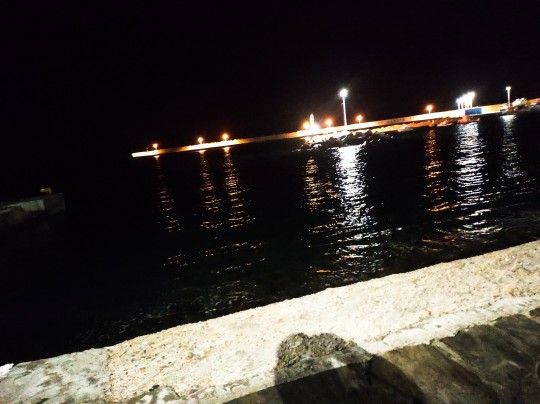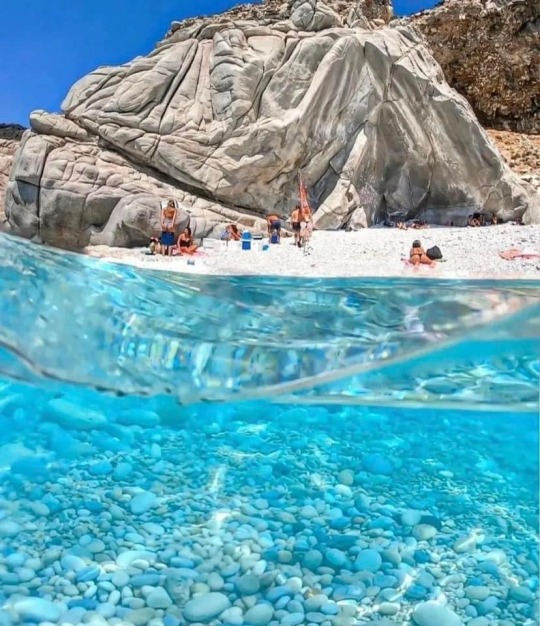#Ikaria
Text
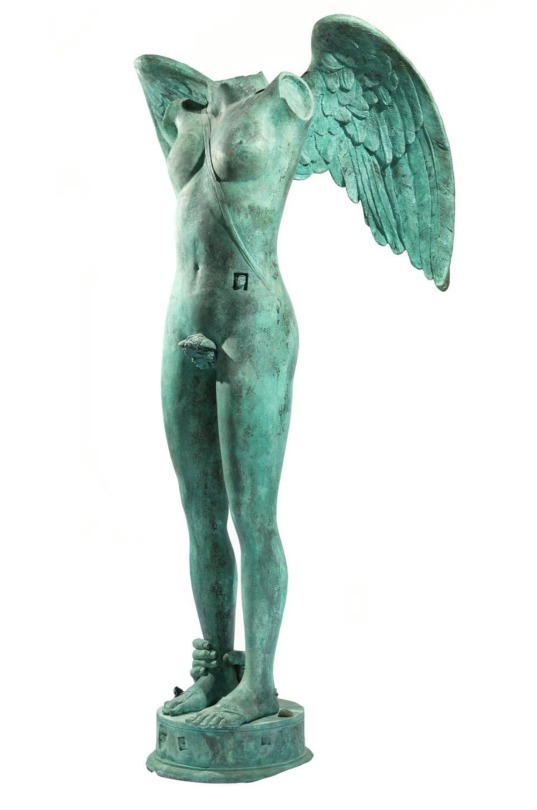
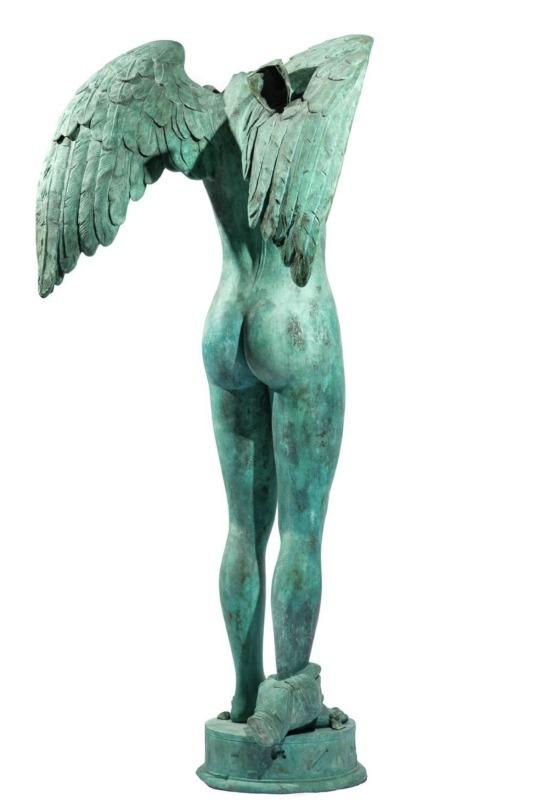
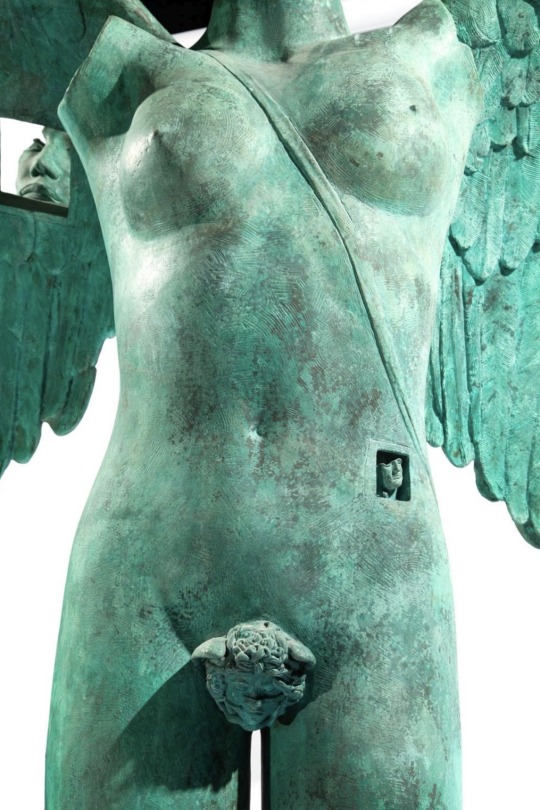
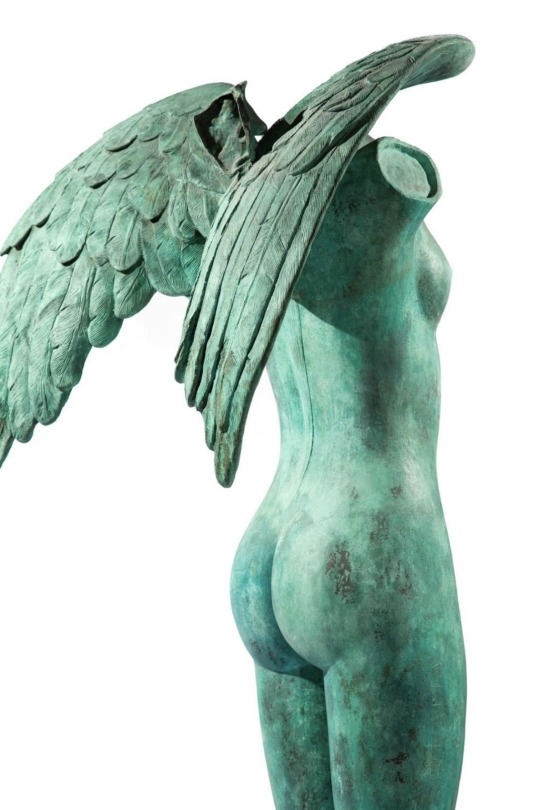
Igor Mitoraj: "Ikaria" (1996)
1K notes
·
View notes
Text

Ηλιοβασίλεμα στο Αιγαίο
Όταν ο ήλιος ενώνεται με την θάλασσα δημιουργείται η γαλήνη
Νας,Ικαρια 2023
#tumblr#athens#greece#greek quotes#greek#greek posts#photos#photography#athens city#αθηνα#ελληνικο ραπ#ελληνικά#sunshine#sunset#Ikaria#καλοκαίρι#γκρικ ταμπλερ#ελληνικο tumblr#ελληνικο ταμπλρ#ελληνικο μπλογκ#ελληνικα#ελληνικο κουοτ
182 notes
·
View notes
Link
Faced with the threat of invaders, Ikaria residents adopted an audacious strategy: moving their homes into the mountains so that the island would appear abandoned from the sea. "Anti-pirate houses" are squat, stone-built dwellings that blend into Ikaria's landscape.
(The history of Ikaria is fascinating, so I’m gonna add some notes)
the sea was both Ikaria's blessing and curse. It allowed the island to spread its reputation for its excellent – and potent – Pramnian wine, and trade its prized product across ancient Greece, along with olives and honey. But the sea also brought pirates, lured by the island's highly regarded produce and the prosperity it brought.
Ikaria never had a reputation of prosperity, on the contrary it had a reputation of poverty. It had olives and wine? Congratulations, so did literally everyone else. What it didn’t have was a good natural harbour, which put it at an immediate disadvantage against all its neighbours, who had olives and wine AND a bunch of other products AND a harbour. Most notably Rhodes, which was right next door and rich as fuck. In the antiquity, the main reason to go to Ikaria was its hot springs, some temples, and not much else.
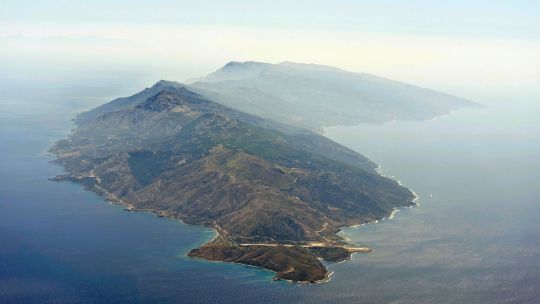
Ikaria was not unique within Greece in being beleaguered by pirates, but it suffered the additional complication of a revolving door of rulers. The Persian Empire, the Delian League association of Greek city states, the Romans, the Byzantine Empire, the Republic of Genoa and the Knights of St John all exercised varying degrees of influence over Ikaria between 500 BCE and 1521 CE, at which point Ikaria fell firmly into the Ottoman Empire, where it would remain for more than three centuries.
“Revolving door of rulers” is a pretty standard situation in the Mediterranean. Even before Ottoman rule, Ikaria develops a reputation of extreme poverty, and a culture of being poor – and yet self-sufficient. Ikarians might refuse luxuries even when they were offered to them. There were stories of travelers who’d insist on sleeping on the floor and subsisting on next to nothing (“ah yes, he’s Ikarian; they’re weird over there”). “Poor like an Ikarian” became an idiom. The Knights of St John at some point gained sovereignty over Ikaria by treaty, and didn’t even bother to send anyone to collect taxes. They were like bah, never mind, they got no money there. In fact, for a span there was no currency left on the island, people traded a few goods with the outside world via good old barter, and would just... sort it out among themselves, sharing produce and labour. It was kind of a commune. Kind of. (There were still elders in charge; can’t get rid of the damn elders).
There’s a local legend that perfectly illustrates this communal spirit: “Once the Ottoman tax-collector came to Ikaria, and ordered four local lads to carry him on a litter up to the mountain villages, where not even mules could tread. When they were far in the wilderness, the four lads chucked him off a cliff and killed him. The agha, the local lord, found out about the killing and ordered all Ikarians in the town to stand before him. “Who did this dreadful deed?” he asked them. And the Ikarians took a step forward, and said in one voice “All of us, my lord”. The agha was impressed, and extracted only minimal compensation from the town.”
Now, this literal “I am Spartacus!” moment is not history, it’s just a story, but it’s telling because it shows what image Ikarians had for themselves, what they aspired to be. And it’s different. Any other place in the vicinity would tell the legend of a heroic individual heroically defying the authorities all by his heroic lonesome, and here come these weird dirt-poor Ikarians and just go “all of us”. [See also Fuenteovejuna, a 1619 play by Lope de Vega, with a remarkably similar plot: the village of Fuenteovejuna in Castille is horribly oppressed by its landlord, a vile and sadistic Knight, until he gets murdered. When the crown investigates, all the peasants report that the culprit was "Fuente Ovejuna", the village itself. Realising that no one will confess and no one will inform, even under torture, and also that the fucker deserved it, the magistrate closes the investigation.]
In any case, Ikaria had neither taxes nor a strategic or geopolitical advantage to offer to states, which is why nobody bothered to take the island back after the Ottomans got hold of it, and some ignored it even when they had it. But for pirates, it was a target as much as any other place. Pirates grabbed people.

But due to its geography, the island was always an outpost of whichever territory it was within, and regular periods of instability, along with inadequately policed coastlines, allowed piracy to flourish.
While piracy was first reported on Ikaria in the 1st Century BCE, it became a more-or-less unchecked threat during Roman rule (late 3rd Century BCE to 5th Century CE) and Byzantine rule (5th to 12th Centuries CE). Then, after the arrival of the Genoese in the 14th Century, Ikarians resorted to destroying their own ports to deter invaders. Even this act was not enough.
The Romans did get rid of piracy for a hot second (i.e. they kept it all to themselves), but it didn’t last.
Lacking resources to repel their aggressors, islanders decided to call their bluff. They withdrew deep into their mountainous interior, going to every possible length to convince anyone sailing past that Ikaria was deserted by building communities that were ostensibly invisible – at least, in the days before electricity. It was this elaborate and audacious disappearing act, pulled off by islanders for several centuries, that I'd come to learn more about.
For comparison, what most islands did to fend off pirates was to retreat inland, move the main town / administrative centre from its natural location at the harbour to the top of whatever hill or mountain they had, and build a fort in it, with walls and iron gates.
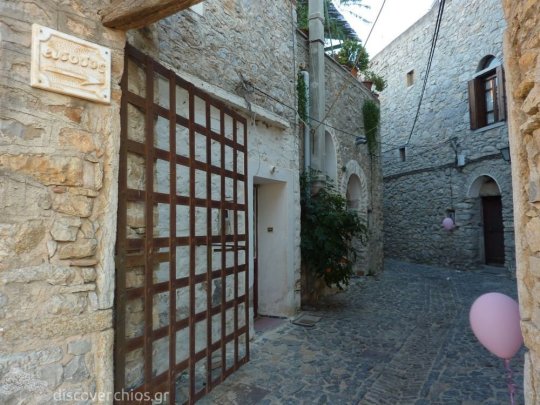
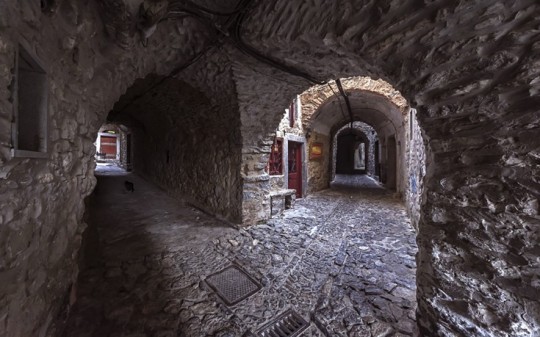

The castle-village of Mesta, on the island of Chios, built in the ~12th c. to defend the locals from pirates. A bit later the Genoans fortified it further. Walls and turrets outside, and inside a labyrinth of narrow streets, stone buildings, and arches that connected second stories so that people could flee from one house to the other, or rush to each other’s defence. It was worth the expense for the Genoans, as the region produced mastic and brought in a lot of money. Ikaria was not so fortunate.
The idea was to be high enough to see ships coming and pirates landing, ring bells and/or light fires to let the population know, put everyone inside the gates, leave fields and animals and whatever valuables left outside undefended, and save the people. Because what pirates were mostly after was people.
the types of homes the retreating islanders decided to build in Ikaria [are] commonly known as "anti-pirate houses".

"Anti-pirate houses" are squat, stone-built dwellings that blend into Ikaria's landscape
These squat, stone-built dwellings incorporated natural features of the landscape, such as rocks, cliff overhangs and thickets. Boulders, which were strewn over the high mountain slopes, often formed much of the walls and ceiling, while dry-stone walls made up the other walls. Living arrangements were simple – houses had little more than a door and a hearth, as islanders would spend the majority of their time outdoors.
Ikarians were building homes designed to be seen by no-one, and to do it they had to go high up into the wilderness where they could not be observed from sea. There would have been many occasions from Roman times onward when they would have temporarily hidden in the mountains from invaders, so the possibility of doing so was always in their minds, if it were needed."
It was the incorporation of Ikaria into the Ottoman Empire that persuaded Ikarians to completely decamp from the coast to the crags. The Ottomans proceeded to rule Ikaria laxly, allowing buccaneering to run rife as a means of disrupting and discouraging sea trade from other states.
Oh the ball had been lost long before the Ottomans came along. That said, they didn’t help.
The choices facing Ikarians under such threat were limited: fight, with scant means at their disposal, to their probable deaths; vacate the island for safer shores; or seek sanctuary in the safety of the mountains.
This time, however, it would be a long-term move. Islanders would conceal their society in the rocky upper reaches of Ikaria's Aetheras range for the next 300 years. This period was dubbed the "piratiki epochi" (pirate era), with the early years tellingly known as the "century of obscurity".
One theory is that Ikarians did vacate the island for safer shores, hence the century of obscurity. Small islands got depopulated and repopulated all the time (and often served as pirate hideouts when deserted by inhabitants). The other theory is that the Ikarians just hid so damn well, and they might have! That reputation and culture of extreme poverty must have come out an extreme situation.
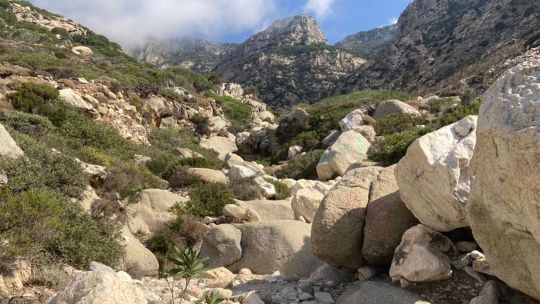
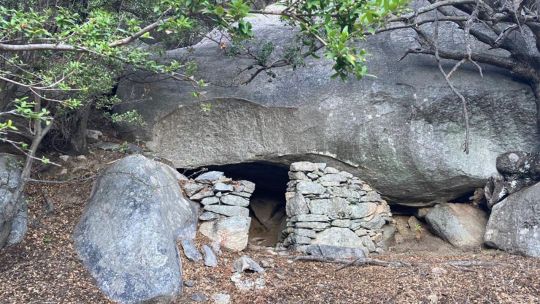
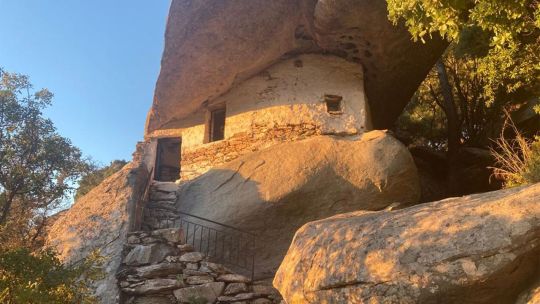
[Aaaand this is where I ran out of steam. Go read the rest of the article!]
78 notes
·
View notes
Text
πονάνε οι αλήθειες που μαθαίνεις απτό ψέμα
και έχεις πάψει να εμπιστεύεσαι
μα αυτό σε κάνει να μην δένεσαι
έχει ασφάλεια η μοναξιά μα καταβαθος
την σιχαίνομαι.
Novel 729/Nosfer-Thyella.
37 notes
·
View notes
Text
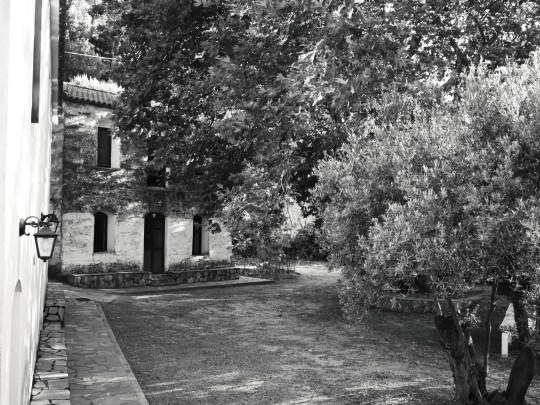
Greece, Ikaria, Christos
#jlepape#monochrome#blackandwhite#bnw#photographers on tumblr#photooftheday#landscapephoto#bw_lover#photography#original photographers#raw community#greece#ikaria
52 notes
·
View notes
Text
Grèce : Les maisons anti-pirates de l’île d’Ikaria.

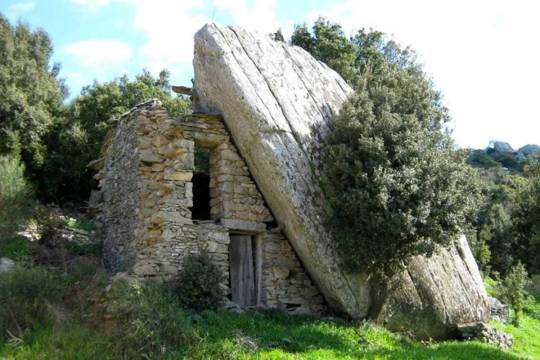
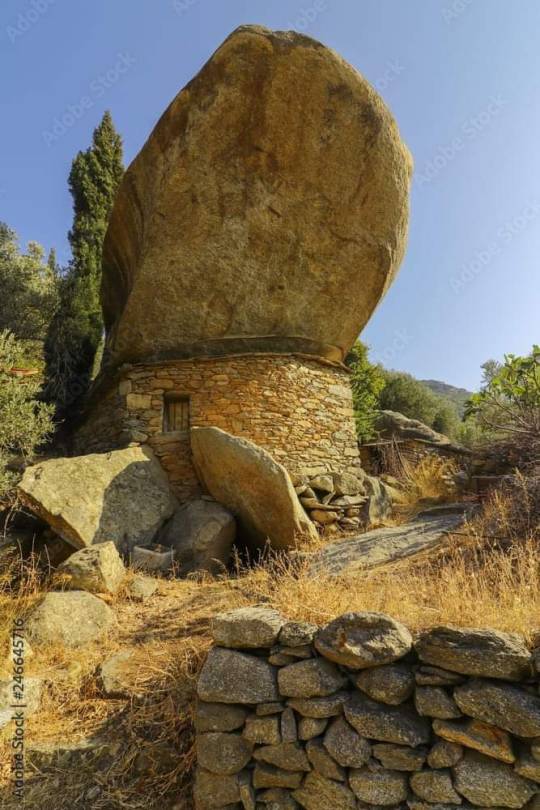
Les pirates, aussi vieux que la marine, ont été un terrible fléau en Méditerranée depuis l’Antiquité, puisque le grand Pompée fut chargé de mener une expédition pour les exterminer. Ils ont particulièrement sévi dans les nombreuse îles grecques qui leur servaient de refuge. Ikaria a été leur victime à plusieurs époques, l’îlot voisin de Phourni constituant une base de raids idéale. Les habitants cessaient alors de vivre sur les côtes et se réfugiaient dans les montagnes où la géologie les protégeait, on trouve souvent de grands blocs de pierre plus ou moins plats formant un toit naturel qu’il suffisait de fermer par un ou deux murs. Visibles seulement de tout près, ils ont permis aux Ikariotes de disparaître littéralement pendant tout le XVIIe siècle, au point que l’île semblait inhabitée. Pour éviter d’attirer l’attention, les maisons n’avaient généralement qu’un seul niveau, plus bas que le rocher ou la falaise qui la camouflait et elles n’avaient pas de cheminée, pour éviter les colonnes de fumée. Les habitants interagissaient principalement la nuit et évitaient d’utiliser le feu ou toute source de lumière, et ils ne gardaient même pas de chiens, de peur que leurs aboiements n’attirent des invités indésirables. Quand par hasard des pirates parvenaient jusqu’à ces refuges, les habitants, prévenus par un système de guetteurs, avaient disparu. Les brigands ne trouvaient chez ces gens très pauvres, que quelques hardes ou objets sans valeur et en étaient pour leurs frais. Fait intéressant, malgré les difficultés endurées par les habitants au cours des siècles, Ikaria est connue comme la terre de la longévité en Grèce, où une personne sur trois finit par vivre jusqu’à 90 ans et beaucoup deviennent centenaires. Greece: The anti-pirate houses on the island of Ikaria. Pirates, who are as old as the sea, have been a terrible scourge in the Mediterranean since Antiquity, when the great Pompey was commissioned to lead an expedition to exterminate them. They were particularly rampant on the many Greek islands that served as their refuge. Ikaria has been their victim at various times, with the neighbouring islet of Phourni providing an ideal base for raids. The inhabitants stopped living on the coast and took refuge in the mountains, where the geology protected them: large, more or less flat blocks of stone are often found, forming a natural roof that could be closed off with one or two walls. Only visible up close, they allowed the Ikariotes to literally disappear throughout the 17th century, to the point where the island seemed uninhabited. To avoid attracting attention, the houses were generally only one storey high, lower than the rock or cliff that camouflaged them, and had no chimneys to avoid smoke columns. The inhabitants interacted mainly at night and avoided using fire or any source of light, and they didn't even keep dogs, for fear that their barking would attract unwanted guests. When by chance pirates reached these refuges, the inhabitants, warned by a system of lookouts, disappeared. The brigands would only find a few items of clothing or worthless objects in the homes of these very poor people, and they would have had their money's worth. Interestingly, despite the hardships endured by the inhabitants over the centuries, Ikaria is known as the land of longevity in Greece, where one in three people ends up living to the age of 90 and many become centenarians. Muriel Marchand
2 notes
·
View notes
Text
My 🩵
3 notes
·
View notes
Text
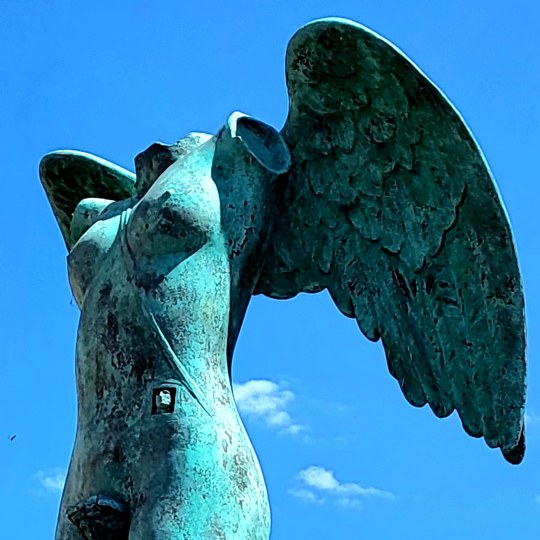
Monumentalna rzeźba IKARIA Igora Mitoraja, wykonana jako odlew z brązu przy Placu Zamkowym w Warszawie (Arkadiusz Miodek)
#rzeźba#monumentalnarzeźba#posąg#odlewzbrązu#sztuka#ikaria#postaćzeskrzydłami#placzamkowywarszawa#zdjęcie#fotografia#arkadiuszmiodek#arekmiodek#arek#arkadiusz#aremioart#aremio#amiod
2 notes
·
View notes
Text
youtube
#jumpingrope#leanbelly3x#leanbellyjuice#diet#exercise#beyond40leanbelly3xsupplement#leanbelly3xsupplement#ikaria#ikarialeanbellyjuicesupplement#ikarialeanbellyjuice#jumprope#jumpropeworkout#loseweight#losebellyfat#healthyloseweight#jumpropedudes#skippingrope#benefitsofjumpingrope#beginnerjumpropeworkout#howtojumprope#jumpropedudesworkout#jumpropedudesbeginnerworkout#jumpropeworkoutweightloss#jumpropeweightloss#jumpropeworkouttoloseweight#jumpingropeworkout#jumpingropeeveryday#jumpingropebenefits#effectsofjumpingrope#howtostartjumpingrope
3 notes
·
View notes
Text
Icaria: where time slows down, and life is savoured.
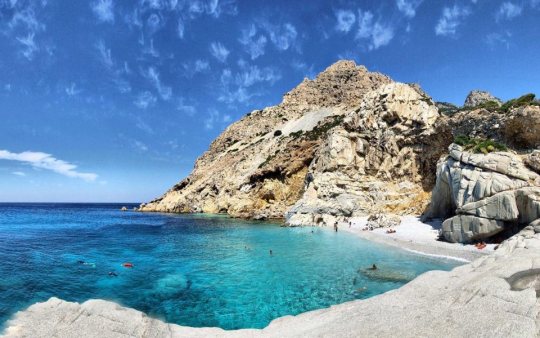
With stunning landscapes and a laid-back atmosphere, this hidden gem is just waiting to be explored. So, sit back and let's discover Icaria together.
Getting to Icaria is a breeze - hop on a flight from Athens or take a ferry from various nearby islands. Nestled between Samos and Mykonos, Icaria is part of the North Aegean Islands in Greece. It's a relatively small island, but it packs a punch with its beauty and charm.
Icaria has earned itself a reputation for being one of the world's few "Blue Zones" - places where people live longer and healthier lives. Researchers have found that locals often live well into their 90s and even 100s. This longevity secret might be related to the island's unique blend of relaxation, fresh food, and strong community spirit.
Speaking of fresh food, Icaria's fertile land produces mouth-watering olives, grapes, and honey. The island is also home to a distinct wine called "pramneios," which has a deliciously fruity taste. As you wander the island, you'll find charming vineyards and olive groves tucked away in the picturesque landscape.
Now, let's dive into the top three things to do on this incredible island:
1. Explore the hot springs: Icaria is known for its therapeutic hot springs. The mineral-rich waters are said to have healing properties, so give it a try and let your worries drift away. Head over to Therma, Lefkada, or Agios Kirykos to indulge in a relaxing soak surrounded by nature.
2. Discover picturesque villages: Icaria is dotted with quaint villages that offer a glimpse into traditional Greek life. Wander the cobbled streets of Armenistis, Raches, or Christos, and enjoy a leisurely coffee at a local kafeneio (café). You'll be charmed by the island's warm hospitality and time-honoured traditions.
3. Hike the island's trails: Nature lovers, rejoice! Icaria has several hiking trails that take you through lush forests, along rugged coastlines, and past ancient ruins. The Halari Gorge and the trail from Nas to Raches are two popular routes.
#goexploregreece#greece#travel#mustsee#mustvisit#greek#europe#beautiful views#holiday#travelling#traveltips#ikaria#aegean#greek islands#today#beautiful photos
5 notes
·
View notes
Text



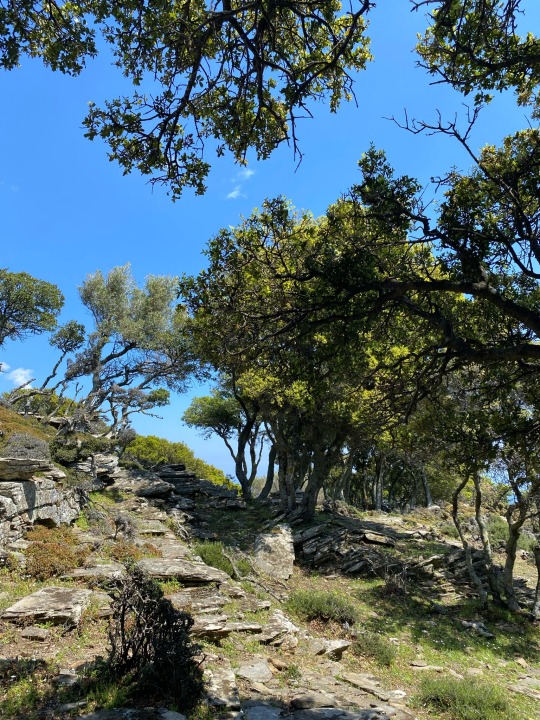
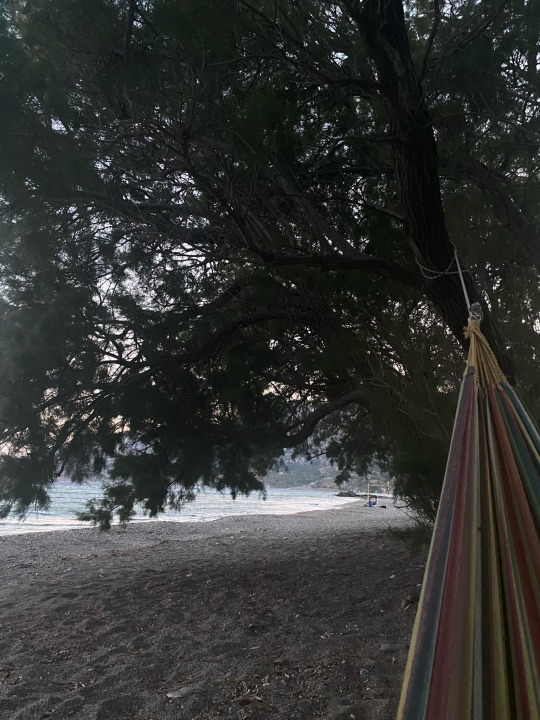

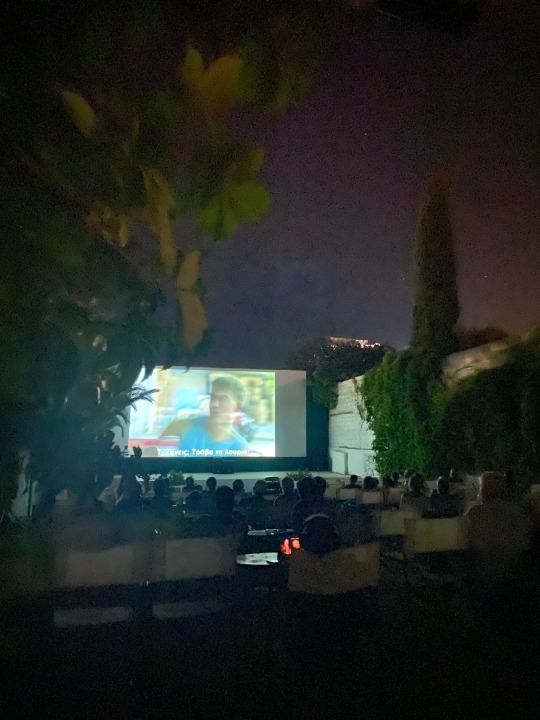
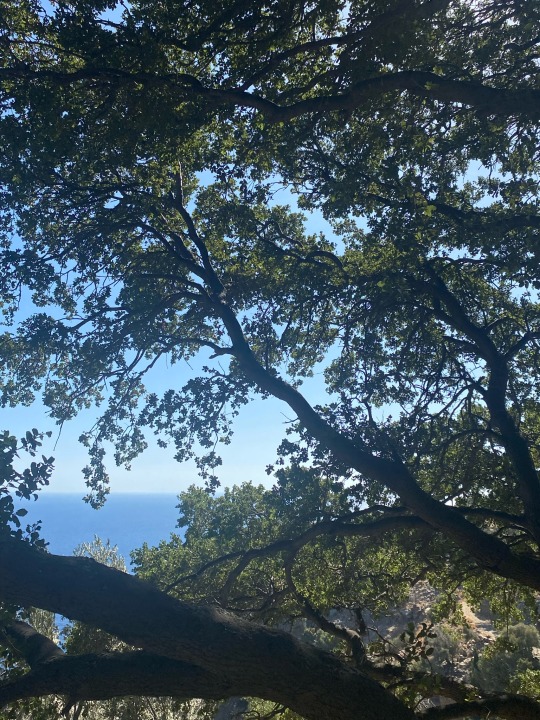
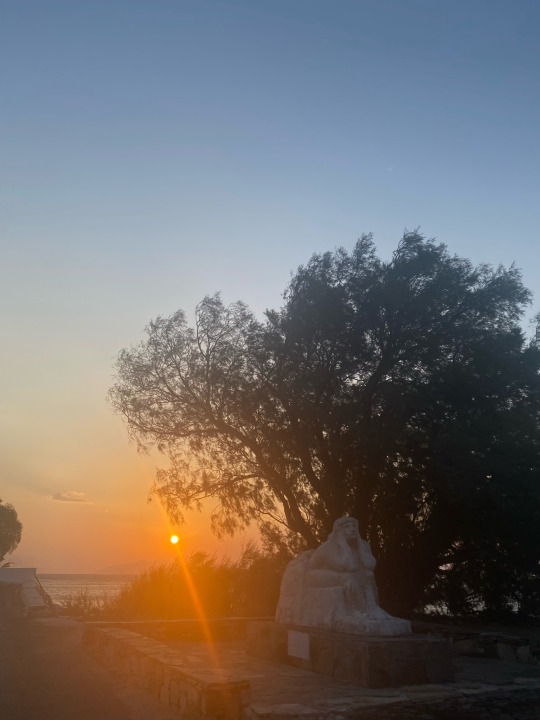

στον παράδεισο έχω σημαδέψει ένα νησί
απαράλλαχτο.
εσυ. κι ένα σπιτι στην θάλασσα.
48 notes
·
View notes
Text

Smiling because even if things don’t go to plan, there are always people out there full of kindness, giving love with abundance. I’m forever grateful for those people and for our beautiful planet.
#Me#Ikaria#Island#Greece#Evdilos#Happy#Sunset#love#people#kindness#sun#sea#grateful#my photo#photography
11 notes
·
View notes
Text

Άλλο λίγο ακόμα ...
Ξέγνοιαστες καλοκαιρινές στιγμές μέχρι να ανατείλει ο ήλιος
Μια σκηνή , μια αιώρα , μπύρες, φίλοι, θάλασσα, ήλιος, έρωτας
7 notes
·
View notes
